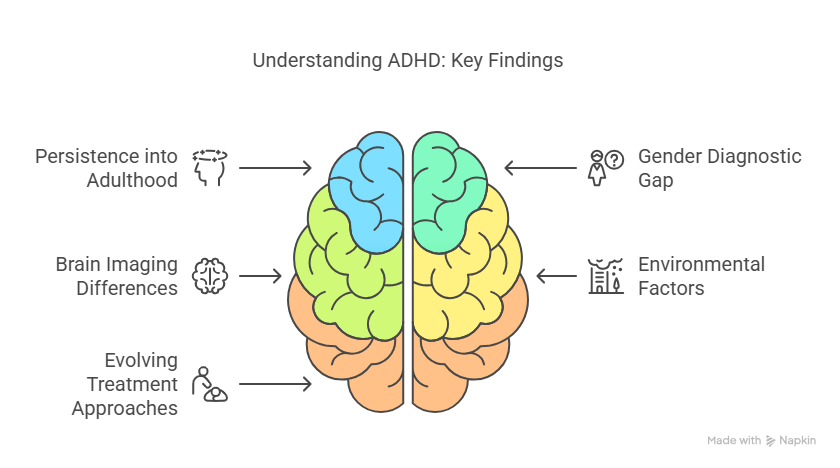In January 2025, a landmark study published in the American Psychiatric Association Journal Psychiatric Research and Clinical Practice revealed surprising shifts in ADHD diagnosis rates, showing a significant increase among adults since 2020. ( Source: www.psychiatry.org ).
Table of Contents
ToggleThis research, one of the most comprehensive to date with over 140,000 participants across four states, challenges our previous understanding of ADHD as primarily a childhood condition.
While the medical community has long recognized ADHD’s impact, new scientific breakthroughs are revolutionizing how we conceptualize this complex neurodevelopmental disorder.
Recent studies indicate that the use of ADHD medications, particularly stimulants, may offer protective benefits against mortality and unintentional injuries among young individuals. This finding is crucial for clinicians involved in treatment decision-making. ( Source: www.psychiatrictimes.com )
Advancements in ADHD research have unveiled a more nuanced understanding of the condition. This article delves into five significant insights from recent studies that are reshaping our approaches to diagnosis, treatment, and support for individuals with ADHD.
Over the past few years, scientists have learned much more about ADHD. It’s now clear that the condition is more complex than we once thought.

This article highlights five important findings from recent studies that are changing how we understand, diagnose, and support people living with ADHD.
1. ADHD Persists Into Adulthood
Recent studies confirm that ADHD isn’t something children simply outgrow. Up to 60% of children diagnosed with ADHD continue experiencing symptoms as adults. While hyperactivity may decrease over time, symptoms like disorganization, trouble concentrating, and emotional regulation issues often worsen in adulthood, significantly impacting careers and relationships.
2. Girls and Women Are Frequently Missed
The research reveals a significant diagnostic gender gap. Girls with ADHD typically display more inattentive symptoms rather than hyperactive behaviors, leading to mischaracterization as simply shy or lazy. Many women go undiagnosed for decades, only receiving support when their struggles become overwhelming in adulthood. More gender-sensitive diagnostic criteria are urgently needed.
3. Brain Imaging Shows Biological Differences
Advanced neuroimaging has revealed clear structural and functional brain differences in people with ADHD. Studies show smaller volumes in key brain regions like the prefrontal cortex, which controls decision-making and impulse control. Research also shows differences in the default mode network (DMN) functioning, confirming ADHD as a real neurological condition.
4. Environmental Factors Play a Crucial Role
While genetics account for 70-80% of ADHD risk ( Source: NIH ), environmental influences are increasingly recognized as important contributors. Prenatal exposure to toxins, childhood adversity, and poor sleep patterns can all worsen symptoms. Emerging research is even examining connections between gut health and ADHD, potentially opening doors to nutritional interventions alongside traditional treatments.
5. Treatment Approaches Are Evolving
Stimulant medications remain effective for many, but the latest research emphasizes more personalized treatment approaches. Behavioral therapy, coaching, mindfulness, and cognitive behavioral therapy (CBT) show significant benefits—especially when combined with medication. Early intervention produces substantially better long-term outcomes for academic performance, mental health, and self-esteem.
Conclusion
ADHD defies simplistic characterization, affecting diverse individuals in unique ways with symptoms that span emotional, cognitive, and behavioral domains. The latest research helps us move beyond outdated stereotypes toward a more scientific, compassionate understanding of living with ADHD. As our knowledge continues to expand, we’re developing more accurate diagnostic tools and effective treatment plans that embrace neurodiversity rather than stigmatizing it. Laying this solid foundation will help those with ADHD thrive for years to come.
Resources: 5 Takeaways From New Research About A.D.H.D. (https://vocal.media/humans/5-takeaways-from-new-research-about-a-d-h-d)


